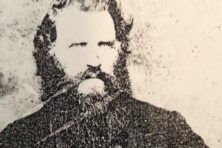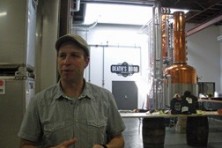After a Death
- Share
- Tweet
- Pin
- Share
The two people walked back towards the car in the cool sunny afternoon of that particular October day. There had been a small enough turnout at the cemetery so that they hadn’t had to worry about talking to many sympathizers, the way they had at the wake a few days earlier, and about that they were relieved.
It was nice, though, said the woman. I’m glad we could do it this way.
It was nice, said the man. I agree.
They got into the man’s old car, which was starting to rust at the bottom, peeling back the light-green paint and making the car look old. It started up, though, just as it always had, and the engine was a good one still, and sounded good rumbling in the clear cool air.
We really have been lucky, in some ways, he said. We should remember that.
Yes, said the woman.
They were silent for a while, and the man put the car in gear and they left the cemetery. The trees along the street were losing their leaves, and fallen and falling leaves blew softly in the soft autumn wind. People they passed on the street, who were dressed for the cooler weather that was to come, in knit hats and dark brown coats, looked at the old car as it drove by them, and the looks exasperated the two.
Maybe we should take off the sticker, James, said the woman.
No. I’d feel like a liar, I think.
Okay.
And so they continued to drive down the street, which seemed especially busy with people on that particular October day, in the old car with its rust the color of an autumn leaf, and its bright orange sticker that was much brighter than any autumn leaf, and which continued to discomfort them the whole drive home.
They had requested specifically that there be no gathering after the funeral. They went back to the old house at the very end of a dead end street, where it was quiet and they could sit in the back yard and not see anyone. There was a small fish pond they had made a long time ago in the back, with a few varicolored fish swimming in it.
Looks like you’ve been taking good care of it, said the man.
Sometimes, yes, the woman answered. For the most part.
It must be almost time to cover it up for the winter, said the man.
Yes. I don’t want to think about it.
The woman looked away, at nothing, and the man felt that everything he could say was unintentionally laden with meaning, so he tried to say nothing at all. He sat in the big padded lawn chair, leaning forward and staring at the little fish pond with his hands on his chin. They sat that way for a while, and the man looked over at the woman who was still staring at nothing.
You shouldn’t cry, Kat, he said.
I’m not crying, she said.
You look like you might.
I’m not, and I don’t plan on starting just now. So you don’t have to tell me not to.
The man was silent still. He stopped looking at her face, but of course he could tell she was looking at him with the same look, so it didn’t do him any good to pretend he was watching the fish in the fish pond, which he pretended anyhow, for his own mental well-being if nothing else.
I don’t know why I said not to cry, he said. I don’t know why I would try to stop you. I just said it, I guess.
I know.
Never mind. I’m sorry.
Well, why shouldn’t I, anyhow?
They sat, and the day was turning into about as nice a one as you could reasonably expect for late October, cool and sunny, brilliant colored leaves breezing off the branches of the shedding trees.
I don’t know why you shouldn’t, he said. It would be perfectly all right to.
If I were a better person, she said.
Don’t say that, he said. You’re very good. You’re one of the best, I think.
If I had loved her more, she said.
Now let’s not do this now, he said, grasping for her hand with his. Let’s not do this right now, or ever. But especially not right now.
But what else could I have–
Exactly, he said. He grasped her hand tight. Exactly, nothing. That’s why they call it a tragedy, because you can do exactly nothing.
She was crying a little, but had not devolved into the mournful sobbing that the man knew he would not be able to take. So he sat and looked at her and she was wiping at her cheeks with a sleeve softly, and he continued to grasp her hand with his own even when he knew it had been too long.
If we had been better, she said. Together.
Maybe, he said. But I don’t think so.
If I had loved you more, she said. Then maybe.
But you can’t just make something like that happen, by turning a dial, he said.
That’s true. I just wish.
Me too, he said.
Why did she, she said. Then the tears welled up forcefully. The man could not stop them, and he knew he was very weak and that even if he were strong there would be no stopping them now, because the woman had struck at the heart of it, and no one would ever know the answer to the question she had just asked and it would drive them mad for the rest of time to think about it, and she knew that just as well as he but she couldn’t have stopped herself from asking it all the same, eventually, and now here it was, and it lingered in the air after she said it and then she cried very, very hard for a little while. The man could not move, just continued to hold her hand tight and waited. When she was finished she looked at him.
Would you kiss me, she said.
No, he said. I’m sorry.
Could you go now, she said.
Okay.
He withdrew his hand from hers and left her sitting staring at the pool with the fish in it and went around the house to his car. It started up with a low rumble and he backed out of the driveway and drove slowly down the street. He decided to keep the orange sticker on, although it was a little distracting to glimpse it out of the corner of his eye, and it seemed even to himself like a rather obscure point of pride.
John A Maloney studied English at the University of Iowa and that is why he is able to talk it so good. Sometimes he writes things down if they seem interesting, mostly he forgets to. Feel free to buy him a turntable or some whiskey.



